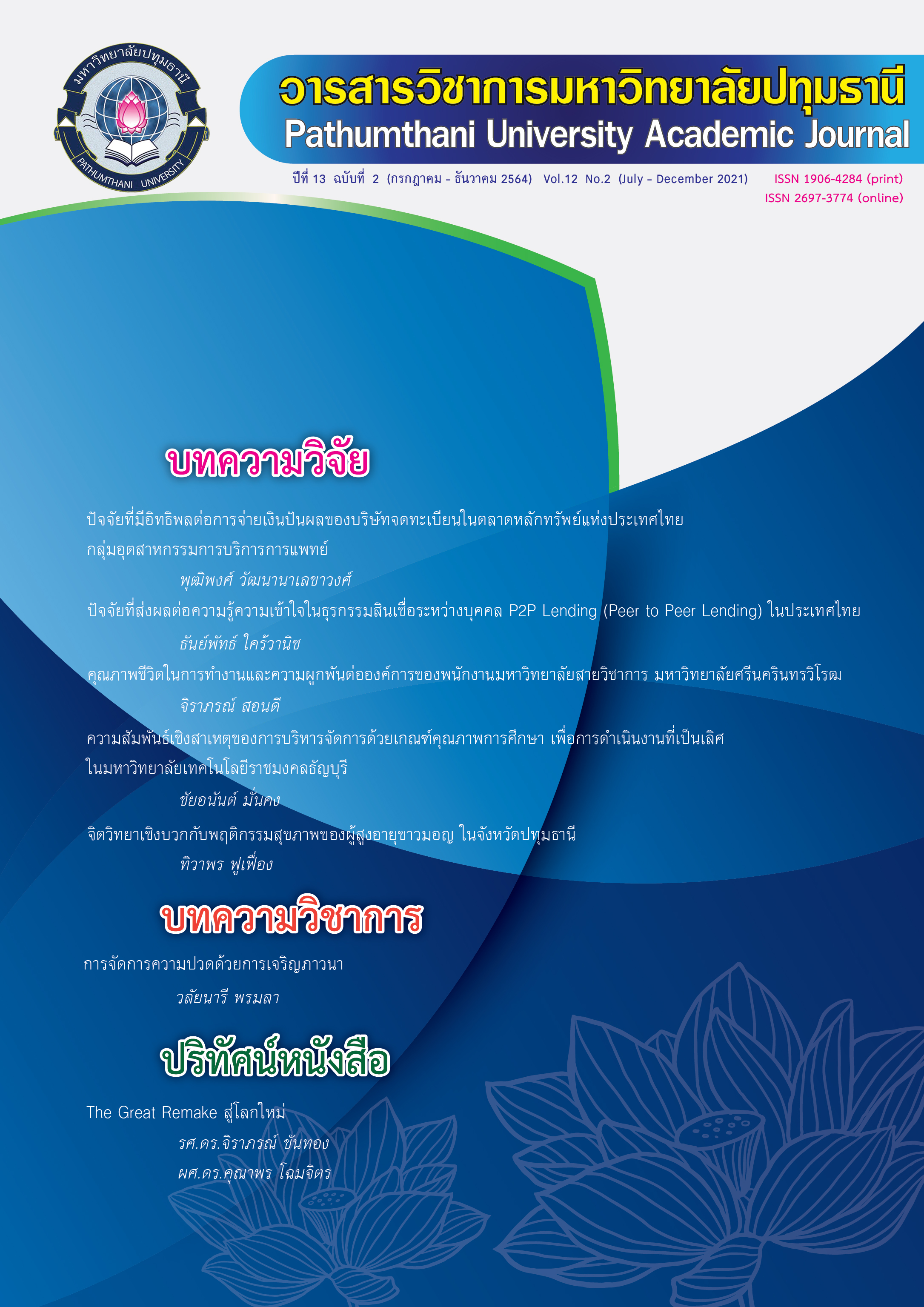คุณภาพชีวิตในการทำงานและความผูกพันต่อองค์การของพนักงานมหาวิทยาลัย สายวิชาการ มหาวิทยาลัยศรีนครินทรวิโรฒ
คำสำคัญ:
คุณภาพชีวิตในการทำงาน, ความผูกพันต่อองค์การ, พนักงานมหาวิทยาลัยบทคัดย่อ
การค้นคว้าอิสระนี้ มีวัตถุประสงค์เพื่อศึกษาคุณภาพชีวิตในการทำงานและความผูกพันต่อองค์การของพนักงานมหาวิทยาลัยสายวิชาการ มหาวิทยาลัยศรีนครินทรวิโรฒ โดยใช้การวิจัยเชิงคุณภาพ (Qualitative Research) ผู้ให้ข้อมูลหลักที่ใช้ในการศึกษา ได้แก่ พนักงานมหาวิทยาลัยสายวิชาการที่มีประสบการณ์ทำงานไม่น้อยกว่า 6 เดือน สังกัดมหาวิทยาลัย ศรีนครินทรวิโรฒ จังหวัดนครนายก จำนวน 10 คน ดำเนินการเก็บรวบรวมข้อมูลโดยใช้วิธีการสัมภาษณ์เชิงลึก และวิเคราะห์ข้อมูลเชิงคุณภาพโดยใช้วิธีการวิเคราะห์เนื้อหา
ผลการศึกษาพบว่า พนักงานมหาวิทยาลัยเป็นทรัพยากรที่ถือได้ว่ามีความสำคัญอย่างยิ่งต่อองค์การ การพัฒนาและส่งเสริมให้พนักงานในองค์การได้มีคุณภาพชีวิตในการทำงานที่ดีและ มีการสร้างขวัญและกำลังใจ และความรู้สึกรักในการทำงานให้กับพนักงานมหาวิทยาลัย จะส่งผลต่อการเพิ่มประสิทธิภาพและประสิทธิผลให้กับองค์การ แนวทางในการส่งเสริมคุณภาพชีวิตในการทำงานสามารถพิจารณาได้จากองค์ประกอบ 8 ด้าน ได้แก่ ด้านค่าตอบแทนที่เพียงพอและยุติธรรม ด้านสิ่งแวดล้อมที่ถูกลักษณะปลอดภัย ด้านความมั่นคงและความก้าวหน้าในงาน ด้านการพัฒนาความสามารถของบุคคล ด้านการทำงานร่วมกันและมีมนุษยสัมพันธ์ ด้านประชาธิปไตยในองค์การ ด้านความสมดุลระหว่างงานกับชีวิตส่วนตัว และด้านลักษณะงานที่เป็นประโยชน์ต่อสังคม ถ้าผู้นำขององค์การให้ความสำคัญต่อการวางแผนการบริหารทรัพยากรมนุษย์ภายในองค์การ จะส่งผลดีต่อความผูกพันต่อองค์การของพนักงานซึ่งเป็นแรงผลักดันให้พนักงานปฏิบัติงานให้กับองค์การอย่างเต็มความรู้ความสามารถ เพื่อให้บรรลุเป้าหมายที่กำหนดไว้ของมหาวิทยาลัย
เอกสารอ้างอิง
กฤษฏ์ เติมทิพย์ทวีกุล และกฤษดา เชียรวัฒนสุข. (2562). “บุพปัจจัยที่ส่งผลต่อการคงอยู่กับองค์กรของช่างเทคนิคและวิศวกรในอุตสาหกรรมพลาสติกขนาดกลางและขนาดย่อม : กรณีศึกษาโรงงานอุตสาหกรรมพลาสติกในจังหวัดปทุมธานี”. วารสารสันติศึกษาปริทรรศน์ มจร. ปีที่ 7 ฉบับที่ 3. หน้า 823-837.
กฤษดา เชียรวัฒนสุข และคณะ. (2561). “ความสัมพันธ์ระหว่างรูปแบบภาวะผู้นำ รูปแบบภาวะผู้ตามกับความผูกพันต่อองค์กรของพนักงาน”. วารสารสหวิทยาการวิจัย (ฉบับบัณฑิตศึกษา). ปีที่ 7 ฉบับที่ 1. หน้า 25-34.
______. (2562). “สภาพแวดล้อมในการทำงานและแรงจูงใจที่มีผลต่อประสิทธิภาพทีมงาน: ข้อมูลเชิงประจักษ์จากบริษัทผลิตอุปกรณ์คอมพิวเตอร์แห่งหนึ่ง”. วารสารวิชาการมหาวิทยาลัยกรุงเทพธนบุรี. ปีที่ 8 ฉบับที่ 2. หน้า 219-230.
กองสวัสดิการแรงงาน. (2547). คุณภาพชีวิตการทำงาน (Quality of Work Life). อนุสารแรงงาน
ปริญธร สุทวีทรัพย์. (2553). คุณภาพชีวิตของเจ้าหน้าที่สินเชื่อธนาคารไทยพาณิชย์ขนาดใหญ่ในกรุงเทพมหานคร. สารนิพนธ์ปริญญาบริหารธุรกิจมหาบัณฑิต สาขาวิชาการจัดการ. มหาวิทยาลัยเชียงใหม่.
ผจญ เฉลิมสาร.(2540). คุณภาพชีวิตการทำงาน. Productivity World. 2540. [ออนไลน์]. เข้าถึงได้จาก http://www.thaimarketcenter.com. เมื่อวันที่ 20 พฤศจิกายน 2563.
ยิ่งยศ จันปาน และจันทนา แสนสุข. (2559). “คุณภาพชีวิตในการทำงาน สภาพแวดล้อมในการทำงาน และความพึงพอใจในการปฏิบัติงานของพนักงาน บริษัทเบสเท๊กซ์ (ประเทศไทย) จำกัด.” วารสารสุทธิปริทัศน์. ปีที่ 30 ฉบับที่ 94. หน้า 98-111.
รุ่งอรุณ ศิลป์ประกอบ. (2558). ความสัมพันธ์ระหว่างคุณภาพชีวิตการทำงานกับความผูกพันต่อองค์การของบุคลากรโรงพยาบาลธรรมศาสตร์เฉลิมพระเกียรติ. สารนิพนธ์ปริญญาบริหารธุรกิจมหาบัณฑิต สาขาวิชาบริหารธุรกิจ. มหาวิทยาลัยราชภัฏวไลยอลงกรณ์ ในพระบรมราชูปถัมภ์.
วินัย มาลีสา. (2553). การศึกษาพฤติกรรมของพนักงานขับรถกับต้นทุนการขนส่งสินค้า กรณีศึกษา: บริษัท สุรินทร์ออมน่าเคมิคอล (ประเทศไทย) จำกัด. สารนิพนธ์ปริญญาบริหารธุรกิจมหาบัณฑิต. มหาวิทยาลัยราชภัฏสวนสุนันทา
ศศินันท์ ทิพย์โอสถ และกฤษดา เชียรวัฒนสุข. (2556). “การรับรู้การสนับสนุนจากองค์การของพนักงานที่มีผลต่อการปฏิบัติงานในภาคธุรกิจธนาคาร.” ใน รายงานการประชุมวิชาการระดับชาติ RMUTT Global Business and Economics Conference (TBEC), มหาวิทยาลัยเทคโนโลยีราชมงคลธัญบุรี. หน้า 915-930.
Allen, N. J. & Meyer, J. P. (1990). “The measurement and antecedents of affective, continuance and normative commitment to the organization”. Journal of Occupational Psychology. Vol 63 No. 1. pp 1–18
Deery, M. & Jago, L. (2015). Revisiting talent management, work-life balance and retention strategies. International Journal of Contemporary Hospitality Management. Vol 27 No. 3. pp 453-472.
Gilmer, V. B. (1973). Applied Psychology. New York: Mc Graw-Hill
Walton, R. E. (1973). Quality of Working Life: What is it? Sloan Management Review. Vol 4 No. 7. Pp 20-23.
Sirgy, M. J. and others. (2001). “A new measure of quality of work life (QWL) based on need satisfaction and spillover theories. Social indicators research. Vol 55 No. 3. pp 241-302.
ดาวน์โหลด
เผยแพร่แล้ว
รูปแบบการอ้างอิง
ฉบับ
ประเภทบทความ
สัญญาอนุญาต
บทความที่ได้รับการตีพิมพ์เป็นลิขสิทธิ์ของวารสารมหาวิทยาลัยปทุมธานี
ข้อความที่ปรากฎในบทความแต่ละเรื่อง เป็นความคิดเห็นส่วนตัวของผู้เขียน กองบรรณาธิการไม่จำเป็นต้องเห็นด้วยเสมอไป และไม่มีส่วนรับผิดชอบใด ๆ ถือเป็นความรับผิดชอบของผู้เขียนแต่เพียงผู้เดียว



